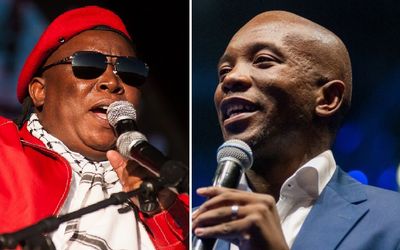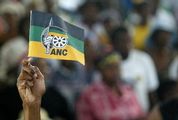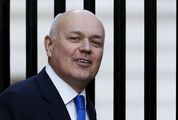LET’s engage in a little speculation and, for the sake of argument, let’s pretend it is nothing more than that.
One possible scenario resulting from the upcoming local government elections is the potential for an opposition coalition government in metros such as Johannesburg, Tshwane and Nelson Mandela Bay.
In such a scenario the African National Congress (ANC) would secure less than 50%, and the Democratic Alliance (DA), whether the majority party or not, might be able to form a coalition government with the help of smaller opposition parties.
This is just one scenario, of course there are others, but this it is around this particular possibility the following discussion revolves.
Of these smaller parties, especially in places such as Johannesburg and Tshwane, the Economic Freedom Fighters (EFF) would be the biggest. In Nelson Mandela Bay, the United Democratic Front (UDF) would compete with the EFF for that status.
There is, however, one fundamental problem: The EFF, both ideologically and pragmatically, would seem to be entirely incompatible with the DA.
The DA has said as much itself. Ahead of the 2014 national and provincial elections, former party leader Helen Zille said: "I wish to state categorically that the DA will not enter into a coalition with the EFF under any circumstances.
"A coalition with the EFF would be unworkable given the huge ideological gulf between our parties. The fact is that the ANC and the EFF are two sides of the same corrupt coin," she said in April 2014.
But current leader Mmusi Maimane has not evoked the same concern. His euphemistic mantra is that the DA will not discuss penalties until the match is played out. That is significant, because the principle Zille invoked has seemingly been suspended, leaving the door open to working with a party it once considered to be just as corrupt and unethical as the ANC.
The prospect of power can be a powerful political aphrodisiac.
For the EFF’s part it seems happy enough to work with pretty much anyone so long, it says, as its seven non-negotiable pillars are not compromised, and a programme of action with targets that do not counter it can be agreed upon.
Of course, with Zille’s attitude have come years of disdain for the EFF from the DA benches. All this communication will have had an effect on DA voters and potential voters alike, who regard the EFF with much contempt, even fear. So, putting principles aside, how would the DA go about credibly selling the prospect of such a coalition to its voters should the opportunity arise?
I run a Twitter polling account at the handle @SADailyPoll. It is relatively new and not yet well followed so the poll samples are extremely small. But, even if they were enormous, this is Twitter, not science, and one can no more deduce anything definitive from these polls than one can at the dinner table. Nevertheless, for the sake of speculative argument, they do help illustrate some of the problems the DA faces.
In turn, as judged by the results to numerous other polls run, it is fair to say the majority of people who have followed @SADailyPoll to date, align themselves with the DA, its policies and positions.
Four polls on a potential DA/EFF coalition have now run on @SADailyPoll and the results frame some of the problems that flow from that possibility. Let us then indulge this unscientific world for a moment.
One of them tested how much the EFF can be trusted. It asked to what degree the participant agreed or disagreed with this statement: "The DA should not form a coalition with the EFF because it cannot be trusted?"
The options were: "Strongly agree"; "Somewhat agree"; "Somewhat disagree"; "Strongly disagree", as they were for all four polls. (Twitter allows you a maximum of four options.)
Seventy six percent of the 120 people who voted strongly agreed (59%) or somewhat agreed (17%) with that statement, which suggests a deep distrust of EFF. Just 24% strongly disagreed (13%) or somewhat disagreed (11%).
Another poll also tested attitudes to EFF values by asking whether the party, if it formed a coalition with the DA would hamper its ability to deliver services — so central to the DA’s brand and exemplified by the prominence it gives to its performance in Cape Town and the Western Cape.
The following statement was put to people: "A DA coalition with the EFF will hamper its ability to deliver services and damage its brand."
In this poll 138 people voted. And, again, there was widespread distrust of the EFF’s potential affect on a DA/EFF coalition government. Eighty two percent of people strongly agreed (57%) or somewhat agreed (25%) with that statement. Just 18% strongly disagreed (6%) or somewhat disagreed (12%).
These two polls, although anecdotal, speak to DA voters’ attitude towards the EFF, and they suggest they are hostile indeed. But what about the principle? How important is that?
A third poll put the following statement to people: "The DA should never enter a coalition with the EFF on principle".
In this poll 118 people voted and 66% strongly agreed (42%) or somewhat agreed (24%) with the statement. Thirty four percent strongly disagreed (16%), or somewhat disagreed with the statement (18%).
Thus far, if we continue to indulge these anecdotes, the obstacles the DA faces in selling the viability of a DA/EFF coalition appear substantial — a lack of trust, a lack of faith in its ability to deliver and a strong opposition, in principle, to any arrangement with the DA’s ideological counter-point.
But politics is all about the power of positioning. And all these things fall on a relative scale. Distrust or animus towards one party or idea can be weighed against a greatest distaste for another party or idea. And, in the ANC, the DA has the perfect foil. Thus, when a DA/EFF coalition was juxtaposed against the alternative, the results changed too.
Presented with this statement: "The DA should enter a coalition with the EFF if it keeps the ANC out", the majority, albeit a slim one, was suddenly in favour of such a coalition.
Of the 118 people that voted, 52% strongly agreed (11%) or somewhat agreed (41%) with the statement, 48% strongly disagreed (36%) or somewhat disagreed (12%) with it.
Even if this trend was representative of a proper sample, however, it is not entirely convincing. Thirty six percent strongly disagreed, the most out of any of the four polls by more than double, meaning those who opposed this best of two worst-worlds scenario felt very strongly about it. In the other direction, although 52% were in general agreement, of those the vast majority were only somewhat in agreement, meaning they were not entirely convinced.
The following questions face the DA:
1. Would DA supporters reject a coalition with the EFF in principle because they hate the EFF?
2. Would being in a coalition with the EFF damage the DA brand because it would degenerate into an ongoing internal conflict that would hamper service delivery?
3. Would being in a coalition with the EFF make a DA government fail, and the risk involved in trying to sell an alternative to the ANC on the basis of failing governments be undermined?
4. Would being in a coalition with the EFF legitimate the EFF in the minds of black voters who choose the DA, making them more open to supporting the EFF instead, given that it is authentically a "black" party?
On the other hand:
1. Do DA voters so badly want to get rid of the ANC government that they are willing to countenance a coalition with the EFF?
2. If so, what would the terms of that coalition have to be (a DA mayor; a programme of action DA supporters could get behind)?
There is also the big picture to consider: Is the risk worth it because SA simply cannot afford an ANC government anymore, and therefore the DA should go for it in the hope of saving SA from the ANC?
Those are the judgments the DA needs to consider. In an ideal world we would have a raft of proper, scientific polling, testing these sorts of positions and sentiment, to see what a significant, demographically representative sample would say. Alas, SA doesn't have much to show on this front.
An outright majority would help the DA avoid any of this unpleasantness. So it will be pushing for this — hard. The party runs its own, highly sophisticated polling behind closed doors, and you can be sure these are the kinds of ideas it will be testing.
Proper analysis may well reveal these results are skewed but if they are in any way representative of how DA voters feel, the party is going to face a turgid time selling the idea of a DA/EFF coalition to an audience that is deeply distrusting of the idea.
How much does the DA want or need power outside of the Western Cape? An EFF coalition will test its principles to the limit.

The Economic Freedom Fighters’ Julius Malema, left, and the Democratic Alliance’s Mmusi Maimane. Picture: THE HERALD/SUNDAY TIMES
LET’s engage in a little speculation and, for the sake of argument, let’s pretend it is nothing more than that.
One possible scenario resulting from the upcoming local government elections is the potential for an opposition coalition government in metros such as Johannesburg, Tshwane and Nelson Mandela Bay.
In such a scenario the African National Congress (ANC) would secure less than 50%, and the Democratic Alliance (DA), whether the majority party or not, might be able to form a coalition government with the help of smaller opposition parties.
This is just one scenario, of course there are others, but this it is around this particular possibility the following discussion revolves.
Of these smaller parties, especially in places such as Johannesburg and Tshwane, the Economic Freedom Fighters (EFF) would be the biggest. In Nelson Mandela Bay, the United Democratic Front (UDF) would compete with the EFF for that status.
There is, however, one fundamental problem: The EFF, both ideologically and pragmatically, would seem to be entirely incompatible with the DA.
The DA has said as much itself. Ahead of the 2014 national and provincial elections, former party leader Helen Zille said: "I wish to state categorically that the DA will not enter into a coalition with the EFF under any circumstances.
"A coalition with the EFF would be unworkable given the huge ideological gulf between our parties. The fact is that the ANC and the EFF are two sides of the same corrupt coin," she said in April 2014.
But current leader Mmusi Maimane has not evoked the same concern. His euphemistic mantra is that the DA will not discuss penalties until the match is played out. That is significant, because the principle Zille invoked has seemingly been suspended, leaving the door open to working with a party it once considered to be just as corrupt and unethical as the ANC.
The prospect of power can be a powerful political aphrodisiac.
For the EFF’s part it seems happy enough to work with pretty much anyone so long, it says, as its seven non-negotiable pillars are not compromised, and a programme of action with targets that do not counter it can be agreed upon.
Of course, with Zille’s attitude have come years of disdain for the EFF from the DA benches. All this communication will have had an effect on DA voters and potential voters alike, who regard the EFF with much contempt, even fear. So, putting principles aside, how would the DA go about credibly selling the prospect of such a coalition to its voters should the opportunity arise?
I run a Twitter polling account at the handle @SADailyPoll. It is relatively new and not yet well followed so the poll samples are extremely small. But, even if they were enormous, this is Twitter, not science, and one can no more deduce anything definitive from these polls than one can at the dinner table. Nevertheless, for the sake of speculative argument, they do help illustrate some of the problems the DA faces.
In turn, as judged by the results to numerous other polls run, it is fair to say the majority of people who have followed @SADailyPoll to date, align themselves with the DA, its policies and positions.
Four polls on a potential DA/EFF coalition have now run on @SADailyPoll and the results frame some of the problems that flow from that possibility. Let us then indulge this unscientific world for a moment.
One of them tested how much the EFF can be trusted. It asked to what degree the participant agreed or disagreed with this statement: "The DA should not form a coalition with the EFF because it cannot be trusted?"
The options were: "Strongly agree"; "Somewhat agree"; "Somewhat disagree"; "Strongly disagree", as they were for all four polls. (Twitter allows you a maximum of four options.)
Seventy six percent of the 120 people who voted strongly agreed (59%) or somewhat agreed (17%) with that statement, which suggests a deep distrust of EFF. Just 24% strongly disagreed (13%) or somewhat disagreed (11%).
Another poll also tested attitudes to EFF values by asking whether the party, if it formed a coalition with the DA would hamper its ability to deliver services — so central to the DA’s brand and exemplified by the prominence it gives to its performance in Cape Town and the Western Cape.
The following statement was put to people: "A DA coalition with the EFF will hamper its ability to deliver services and damage its brand."
In this poll 138 people voted. And, again, there was widespread distrust of the EFF’s potential affect on a DA/EFF coalition government. Eighty two percent of people strongly agreed (57%) or somewhat agreed (25%) with that statement. Just 18% strongly disagreed (6%) or somewhat disagreed (12%).
These two polls, although anecdotal, speak to DA voters’ attitude towards the EFF, and they suggest they are hostile indeed. But what about the principle? How important is that?
A third poll put the following statement to people: "The DA should never enter a coalition with the EFF on principle".
In this poll 118 people voted and 66% strongly agreed (42%) or somewhat agreed (24%) with the statement. Thirty four percent strongly disagreed (16%), or somewhat disagreed with the statement (18%).
Thus far, if we continue to indulge these anecdotes, the obstacles the DA faces in selling the viability of a DA/EFF coalition appear substantial — a lack of trust, a lack of faith in its ability to deliver and a strong opposition, in principle, to any arrangement with the DA’s ideological counter-point.
But politics is all about the power of positioning. And all these things fall on a relative scale. Distrust or animus towards one party or idea can be weighed against a greatest distaste for another party or idea. And, in the ANC, the DA has the perfect foil. Thus, when a DA/EFF coalition was juxtaposed against the alternative, the results changed too.
Presented with this statement: "The DA should enter a coalition with the EFF if it keeps the ANC out", the majority, albeit a slim one, was suddenly in favour of such a coalition.
Of the 118 people that voted, 52% strongly agreed (11%) or somewhat agreed (41%) with the statement, 48% strongly disagreed (36%) or somewhat disagreed (12%) with it.
Even if this trend was representative of a proper sample, however, it is not entirely convincing. Thirty six percent strongly disagreed, the most out of any of the four polls by more than double, meaning those who opposed this best of two worst-worlds scenario felt very strongly about it. In the other direction, although 52% were in general agreement, of those the vast majority were only somewhat in agreement, meaning they were not entirely convinced.
The following questions face the DA:
1. Would DA supporters reject a coalition with the EFF in principle because they hate the EFF?
2. Would being in a coalition with the EFF damage the DA brand because it would degenerate into an ongoing internal conflict that would hamper service delivery?
3. Would being in a coalition with the EFF make a DA government fail, and the risk involved in trying to sell an alternative to the ANC on the basis of failing governments be undermined?
4. Would being in a coalition with the EFF legitimate the EFF in the minds of black voters who choose the DA, making them more open to supporting the EFF instead, given that it is authentically a "black" party?
On the other hand:
1. Do DA voters so badly want to get rid of the ANC government that they are willing to countenance a coalition with the EFF?
2. If so, what would the terms of that coalition have to be (a DA mayor; a programme of action DA supporters could get behind)?
There is also the big picture to consider: Is the risk worth it because SA simply cannot afford an ANC government anymore, and therefore the DA should go for it in the hope of saving SA from the ANC?
Those are the judgments the DA needs to consider. In an ideal world we would have a raft of proper, scientific polling, testing these sorts of positions and sentiment, to see what a significant, demographically representative sample would say. Alas, SA doesn't have much to show on this front.
An outright majority would help the DA avoid any of this unpleasantness. So it will be pushing for this — hard. The party runs its own, highly sophisticated polling behind closed doors, and you can be sure these are the kinds of ideas it will be testing.
Proper analysis may well reveal these results are skewed but if they are in any way representative of how DA voters feel, the party is going to face a turgid time selling the idea of a DA/EFF coalition to an audience that is deeply distrusting of the idea.
How much does the DA want or need power outside of the Western Cape? An EFF coalition will test its principles to the limit.





















Change: 1.19%
Change: 1.36%
Change: 2.19%
Change: 1.49%
Change: -0.77%
Data supplied by Profile Data
Change: -0.19%
Change: 0.69%
Change: 1.19%
Change: 0.00%
Change: 0.44%
Data supplied by Profile Data
Change: 0.62%
Change: 0.61%
Change: 0.23%
Change: 0.52%
Change: 0.12%
Data supplied by Profile Data
Change: -0.21%
Change: -1.22%
Change: -0.69%
Change: -0.51%
Change: 0.07%
Data supplied by Profile Data